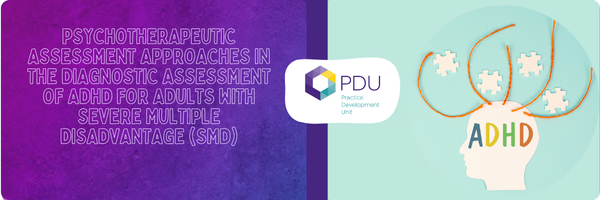
This session was delivered as a webinar via Teams on Thursday 20 March 2025
Part of our Understanding Neurodivergence and Multiple Disadvantage learning series.
Our fifth session in this series was delivered by Lisa Murphy, Chartered Forensic Psychologist and Emma Telling, Assistant Psychologist from Change Grow Live (CGL).
The presentation helped to explore some of the psychological processes and barriers which may be evident for service users with sever and multiple disadvantage (SMD) undertaking diagnostic ADHD assessment. Consideration was given as to how recognising and formulating service users’ experiences within a trauma-informed lens, can help to maximise engagement and associated clinical benefit within assessment.
The presentation outlined the development of the Change Grow live (CGL) Nottinghamshire ADHD Assessment Pathway as an extended psychotherapeutic assessment process for service users with more intensive psychological needs. It referred to the trauma-informed concepts of safety and stabilisation as potential anchors in the framework for diagnostic assessment.
A brief overview of ADHD and diagnostic requirements were shared for anyone who is unfamiliar with this area. The presentation also outlined some practical strategies and clinical techniques for practitioners; and shared relevant knowledge for anyone with an interest in neurodiversity.
Presenters:
- Lisa Murphy is a Forensic Psychologist at Change Grow Live (CGL) Nottinghamshire Drug and Alcohol Services, working as pathway lead for the ADHD Assessment Pathway for adult criminal justice service users (since October 2021). Lisa’s role at CGL is held alongside her work as a clinician within LPFT NHS Forensic Psychology Services.
Lisa has worked in the field of forensic mental health for 20 years, with a specialist interest in the areas of psychological trauma, multi-modal therapeutic interventions, and psychotherapeutic assessment. In addition to specialising in the diagnostic assessment of adult ADHD, Lisa also has ADHD, which was not formally diagnosed until her early 30s.
- Emma Telling has worked as an Assistant Psychologist on the ADHD pathway for Change Grow Live (CGL) since October 2024. Prior to this, Emma worked as a primary school teacher. Emma developed her interest in neurodiversity and adapting teaching practices within the classroom, which led to completing her Psychology Master’s thesis in the relationship between academic self-efficacy and alexithymia.
Materials available to download:
Presentation slides (File type: pdf. Size: 1.25MB)
Clinical needs handout (File type: pdf. Size: 248KB)
A recording of the presentation is available to watch via YouTube. Length: 1 hour 16 minutes.
Watch the video now (click to launch the video in YouTube)